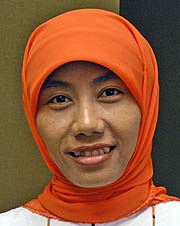UH shares tsunami
relief insights
Isle groups give crisis management
training to a visiting professor
Indonesian officials were not prepared to deal with the mental health of survivors of the Dec. 26 tsunami that killed more than 176,000 people in southern Asia, a counselor from that country says.
![]()

![]()
Susi Fitri: The professor gained insight into healing mental health after a disaster
"The amount of victims is so huge that we can't do it by ourselves," Fitri said. "We don't have enough trained people, so we need to train people without counseling background to deal with these types of situations."
Fitri originally came to the islands in May to present a lecture about "The Veil and Its Controversial Meaning in Indonesia" at a Global Seminar sponsored by the United Nations University and University of Hawaii, but UH officials invited her to stay longer to learn more about crisis counseling from experts on the island.
"We wanted to help the tsunami victims in some way," said Ed Porter, UH-Manoa liaison for international affairs. "One thing we could do is assist in training."
While in Hawaii, Fitri attended workshops and met with counseling experts. She said UH social work professors and Red Cross agents taught her how to develop community support for victims and manage volunteers. She said psychologists from Tripler Army Medical Center gave her papers and books regarding the research of crisis responses.
"I learned how to help both the victims and the volunteers," said Fitri, who works with her university's Crisis Center Unit in Indonesia. "I will make the training I learned here apply to my program back home."
Fitri plans to conduct workshops and meet with individual counselors to share the new approaches to crisis counseling that she learned on Oahu.
"In the West, I learned they tend to talk things out," Fitri noted. "However, in the East where religion runs strong, people tend to gather in mosques to pray and read the Koran. They prefer the feeling of togetherness over talking to a stranger."
Fitri hopes people in Indonesia will become more open to expressing their feelings and discussing their situation with others.
E-mail to City Desk
[News] [Business] [Features] [Sports] [Editorial] [Do It Electric!]
[Classified Ads] [Search] [Subscribe] [Info] [Letter to Editor]
[Feedback]
